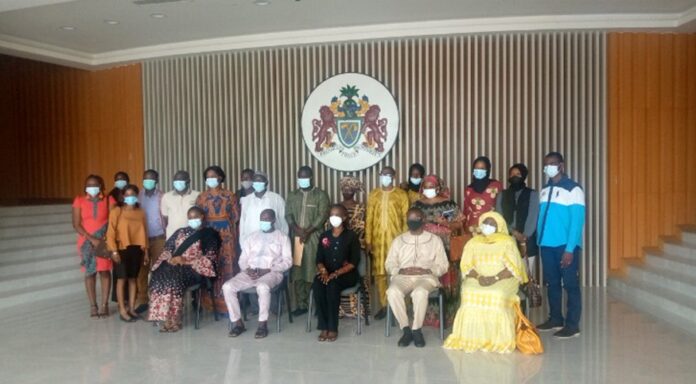By Ndey Sowe
The Inter-Party Committee (IPC) has tasked all political parties, their candidates and supporters, to adhere to the highest standards of electioneering, and to promote peaceful election campaigns in the run up to December 4th presidential elections.
This call came on Saturday 6th November 2021 at a local hotel in Bijilo, during a press conference organized by IPC, with support from NDI and UNDP. The synergy was meant to interact with the media in a bid to curb disinformation, combat hate speech and clear misconceptions around the electoral and political processes.
“The IPC is glad to inform all Gambians and other electoral stakeholders that as of today, all the leaders of the 18 registered political parties have now signed the peace pledge including the president of the Republic Adama Barrow. As soon as the ongoing nomination process, is concluded by the IEC and qualified candidates for the presidential election emerge, all nominated independent candidates will be requested to subscribe to the peace pledge as well,” Amul Njassi, co-chairperson of IPC said.
According to Mr. Nyassi, this has come after the IPC committed the leadership of eighteen registered political parties to sign the peace pledge reffered to as “the Janjanbureh Peace Accord”. He said this was developed during the third IPC quarterly breakfast meeting on September 25th and re-validated at the fourth quarterly breakfast meeting on October 26th, with technical support from development partners such as UNDP, UNOWAS, NDI, RCO, OHCHR, AU and ECOWAS.
The peace pledge signing ceremony was officially witnessed by the Independent Electoral Commission (IEC).
For the information of the readership, the IPC was established by political parties as a forum for dialogue and co- operation to promote adherence to its MoU and code of conduct, promote national reconciliation and ensure consensus building amongst political parties on contested political and electoral issues. Since its establishment, the IPC has partnered with relevant stakeholders to conduct and participate in activities which ensures peaceful co-existence amongst political parties.
The IPC, with support from its partners, is currently implementing a series of programs and interventions to promote transparent, credible and peaceful electoral processes before, during and after the upcoming presidential, legislative and local government elections.
According to Mr. Nyassi, the IPC has also inaugurated the youth and women’s branch as part of its efforts to ensure inclusive participation and representation of women and youth at the IPC and at party levels; that as of recent, the IPC and its partners organized a high level national stakeholders’ forum where political leaders will be committed to the ideal of the IPC in the presence of national and international stakeholders, to support peaceful and credible elections in The Gambia, with special emphasis on the need to avoid hate speech before, on and after election day.
“The IPC, through technical and funding support from NDI and UNDP will also be running peace messages in the form of jingles on various televisions and radio stations in english and five national languages (ie, Mandinka, Wolof, Fula, Jola and Sarahuleh). The peace messages will be aired at the commencement of party campaigns throughout the election period. In addition, the IPC has concluded plans to embark on regional sensitization of Gambians on the provisions of the IPC MoU, code of conduct and the peace pledge, before the commencement of campaigns through support from UNOWAS, UNDP and NDI,” Mr. Nyassi said.
As campaigns commences, the IPC enjoins every political actor to honor the spirit and letter of the Committee’s MOU, the IEC’s code of conduct on elections campaign ethics, and the peace pledge to which all party leaders have agreed. Candidates and their supporters in this election are also urged to accept the election results that will be announced by the IEC, if it is judged to be free, fair and credible.




















